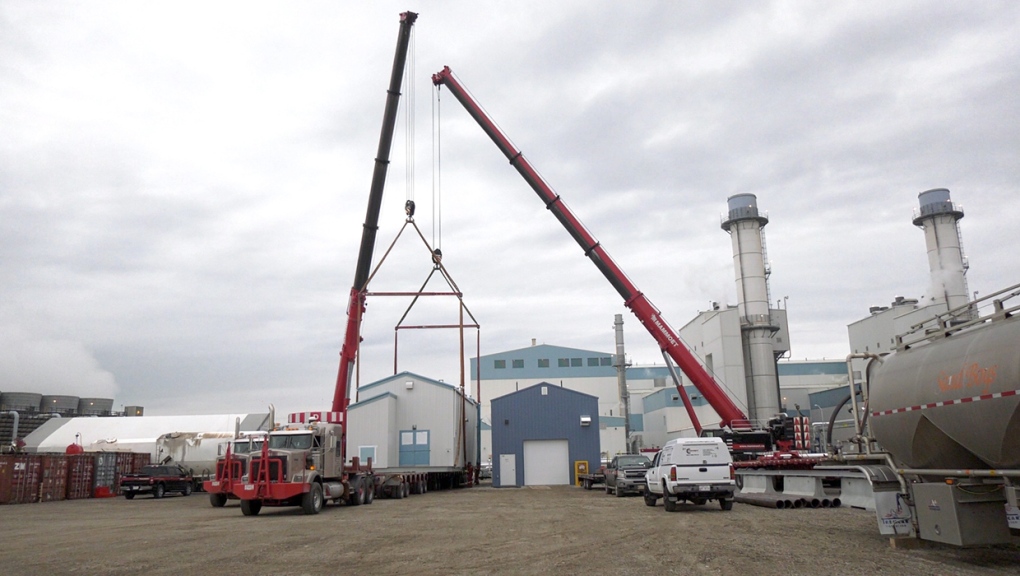Alberta prioritizes oil sands' carbon storage hub, energy minister says
 A giant carbon capture unit being lifted into place at the Shepard Energy Centre east of Calgary
A giant carbon capture unit being lifted into place at the Shepard Energy Centre east of Calgary
The government of Alberta, Canada's main oil-producing province, plans to move forward "very, very quickly" on its next carbon sequestration hub in the Cold Lake region that will serve oil sands producers, Energy Minister Sonya Savage told Reuters.
Alberta is currently accepting requests for proposals to operate an underground carbon storage hub serving the Alberta Industrial Heartland (AIH) zone near Edmonton. The process to select an operator for another hub near Cold Lake will come "on the heels" of that, Savage said in an interview late on Thursday.
"We are going to need to move on Cold Lake very, very quickly after Heartland," Savage said. "It's a hub that will give certainty to oil sands and heavy oil production."
The government is keen to move forward this year on several carbon storage hubs, where an operator will sequester both their own and third-party emissions, so industries in different areas of the provinces are not at a competitive disadvantage.
Carbon capture, utilization and storage (CCUS) is expected to be a key part of global efforts to contain emissions from fossil fuel production. It involves capturing carbon produced from heavy industrial processes like upgrading oil sands bitumen and storing it permanently underground.
"CCUS is probably my number one priority file at the moment," Savage said.
Fatih Birol, the head of the International Energy Agency, said on Thursday his organization considered CCUS to be one of the three most critical decarbonization technologies.
Alberta is aiming to aggressively expand its CCUS industry to help cut emissions and safeguard the future of its energy industry as the world aims for net-zero emissions by 2050. Savage's comments show how that plan is taking shape.
There has also been "tremendous interest" in a hub in the Grand Prairie region, where a lot of natural gas processing takes place, Savage added.
Alberta announced last year it would hold a competitive process for how it allocates underground pore space after a number of companies including Royal Dutch Shell, TC Energy and an alliance of oil sands producers proposed CCS projects.
Savage said the province received nearly 50 expressions of interest in leasing pore space rights from industries ranging from energy to petrochemicals to fertilizer production.
The government asked for formal proposals for the AIH first because they received the most interest in that area, and a number of proposals competing for the exact same underground pore space, Savage said.
Alberta plans to select the AIH sequestration hub operators by the end of March, and Savage said projects that will be up and running quickly are more likely to be successful.
"We have suggested to industry that time is of the essence, we'll be weighted more heavily towards project proposals that will be in service at an earlier date," she said.
Savage said all projects will have to go through a regulatory process, and would likely take a couple of years to start operating.
Reporting by Nia Williams Editing by Marguerita Choy
CTVNews.ca Top Stories

Quebec nurse had to clean up after husband's death in Montreal hospital
On a night she should have been mourning, a nurse from Quebec's Laurentians region says she was forced to clean up her husband after he died at a hospital in Montreal.
Cuban government apologizes to Montreal-area family after delivering wrong body
Cuba's foreign affairs minister has apologized to a Montreal-area family after they were sent the wrong body following the death of a loved one.
What is changing about Canada's capital gains tax and how does it impact me?
The federal government's proposed change to capital gains taxation is expected to increase taxes on investments and mainly affect wealthy Canadians and businesses. Here's what you need to know about the move.
'Anything to win': Trudeau says as Poilievre defends meeting protesters
Prime Minister Justin Trudeau is accusing Conservative Leader Pierre Poilievre of welcoming 'the support of conspiracy theorists and extremists,' after the Conservative leader was photographed meeting with protesters, which his office has defended.
Northern Ont. lawyer who abandoned clients in child protection cases disbarred
A North Bay, Ont., lawyer who abandoned 15 clients – many of them child protection cases – has lost his licence to practise law.
Boeing's financial woes continue, while families of crash victims urge U.S. to prosecute the company
Boeing said Wednesday that it lost US$355 million on falling revenue in the first quarter, another sign of the crisis gripping the aircraft manufacturer as it faces increasing scrutiny over the safety of its planes and accusations of shoddy work from a growing number of whistleblowers.
Bank of Canada officials split on when to start cutting interest rates
Members of the Bank of Canada's governing council were split on how long the central bank should wait before it starts cutting interest rates when they met earlier this month.
Fair in Ontario, flurries in Labrador: Weather systems make for an erratic spring
"It's a bit of a complicated pattern; we've got a lot going on," said Jennifer Smith of the Meteorological Service of Canada in an interview with CTVNews.ca on Wednesday. "[As is] typical with weather, all of these things are related."
Police tangle with students in Texas and California as wave of campus protest against Gaza war grows
Police tangled with student demonstrators in Texas and California while new encampments sprouted Wednesday at Harvard and other colleges as school leaders sought ways to defuse a growing wave of pro-Palestinian protests.































